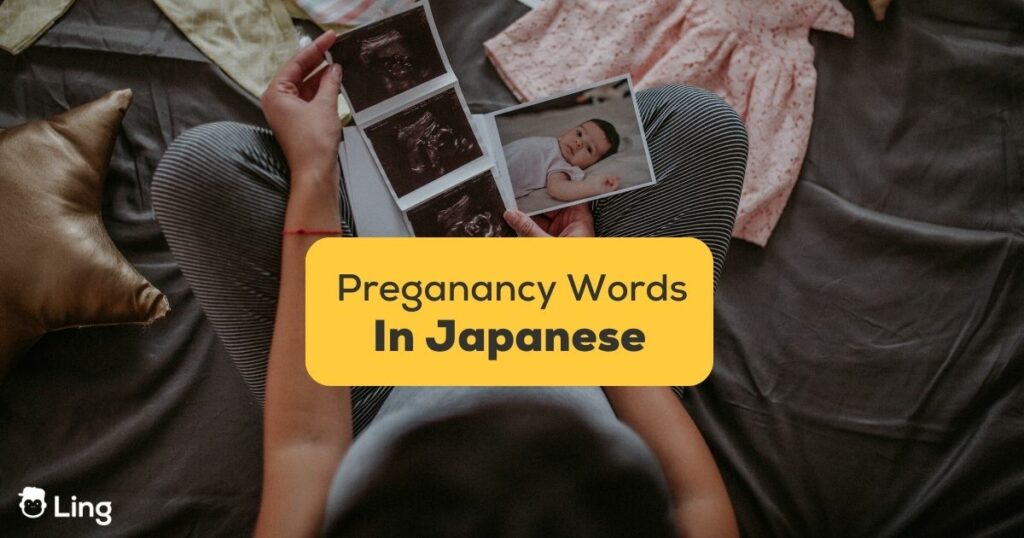With over 124 million people residing in Japan, it’s inevitable to stumble upon a pregnant woman once in a while. For those eager to learn Japanese while navigating the exhilarating journey of pregnancy, understanding the beautiful lingo becomes a vital part of this life-changing experience. In this article, we’ll go over the basic Japanese words for pregnancy or 妊娠 (にんしん/Ninshin). Whether you’re a curious language enthusiast or on your very own rollercoaster of expecting a miracle, knowing the essential Japanese words for pregnancy can come in handy. Let’s begin!
What Is “Pregnancy” In Japanese?
Put on your learning hats (and baby bibs) as we unveil what 妊娠 (にんしん/Ninshin) means in Japanese. That’s right, my friends, it directly translates to “pregnancy.” It’s the magic word that opens the door to an exciting world of baby bump selfies, nesting, and sampling the weirdest food pairings ever known to mankind!
Happened to be working in Japan while pregnant? Fear not, potential 母親 (Hahaoya) (aka mom). Japan has some wonderful maternity benefits that have your back (and baby bump). Let’s take a whirlwind tour, shall we?
Called 産前産後休業 (Sanzen Sango Kyūgyō), pregnancy in Japan comes with a generous maternity leave policy. Expecting mothers can take a leave of 6 weeks (14 weeks for twins – double the joy, remember?) before the due date and 8 weeks post childbirth. Japan’s maternal healthcare also includes regular check-ups, blood tests, ultrasound examinations, and even vaccinations. Hooked yet? The best part is that a large portion of these medical expenses is covered under the Mother and Child Health Handbook system, also known as the 母子健康手帳 (Boshi Kenkō Techō).
Hello 出産手当金 (Shussan Teatekin), aka childbirth allowance! Under Japan’s health insurance system, you’re eligible for a lump sum childbirth allowance. And the perks continue with 子育て支援金 (Kosodate Shienkin), child-rearing support payments, to ease the journey further.
Japanese Words For Pregnancy
Get ready, linguistic adventurers, because we’re pulling back the curtain on Japanese words for pregnancy. From conception to birth, every stage is marked with a unique term that’s just as special as the life-changing journey itself. Let’s dive in, shall we?
妊婦 (Ninpu): Pregant Woman
Initially, you might think Ninpu simply translates to ‘a pregnant woman.’ But, oh, the depth it carries! It embodies not just the physical state of pregnancy but also walks hand-in-hand with emotional resilience, maternal anticipation, and a dash of 懐かしい (nostalgia) thrown in. In the usage of 妊婦 (Ninpu), the transformation of a woman into a mother takes on powerful resonance. Plus, isn’t there something deeply respectful about recognizing the might and grace of a pregnant woman in just one word?
Example sentence:
- 妊婦はたくさんの休息が必要です
- Ninpu wa takusan no kyūsoku ga hitsuyōdesu.
- A pregnant woman requires plenty of rest.

御産 (Osan): Childbirth
A curtain call of pregnancy! Osan literally refers to childbirth. 御産 (Osan) also embodies the band of sweat on a mother’s forehead, the gripping anticipation in a father’s heart, the collective prayers of family and friends, and the first cry that floods the room with a joy unparalleled. It’s the moment where life takes form, where the future unfolds, where love incarnates—summed up in a succinct, impactful two-character Kanji term.
Example sentence:
- 彼女は安全な御産を望んでいます
- Kanojo wa anzen na osan o nozondeimasu.
- She wishes for a safe childbirth.
生理 (Seiri): Menstrual Period
Although not distinctly a pregnancy term, seiri is where the stories begin for many hopeful parents-to-be. Don’t underestimate this ‘monthly visitor’, it’s the initial breadcrumb on your trail!
Example sentence:
- 彼女の生理が遅れています
- Kanojo no seiri ga okureteimasu.
- Her period is late.
待ち月 (Machizuki): Due Month
For the Japanese, the expectation of childbirth is met with poetic grace: Machizuki, or the awaiting month, is the anticipated due date. Can you feel the hushed excitement? マタニティーブルー (Maternity Blue), anyone?
Example sentence:
- 彼女の待ち月は12月です
- Kanojo no machizuki wa junigatsu desu.
- Her due month is December.

名付け親 (Nafukesha): Godparent
Did you know that even your baby’s guardian angel has a title in Japanese? We present the fabulous 名付け親 (Nafukesha), which translates to “godparent.” Get ready to draft a list of superstar candidates!
Example sentence:
- 彼は私たちの子供の名付け親になります
- Kare wa watashitachi no kodomo no nafukesha ni narimasu.
- He will become our child’s godparent.
お腹 (Onaka): Belly
When your little one starts breakdancing inside you, it’s important to know the term for your ever-growing belly. As one’s pregnancy progresses, so does the growth of their お腹 (Onaka). But this growing belly is more than just space for the joyful womb-dweller; it symbolizes a mother’s nurturing embrace, a womb of warmth, and a life-transitioning milestone all wrapped in the comforting folds of お腹 (Onaka).
Example sentence:
- 赤ちゃんがお腹で動いています
- Aka-chan ga onaka de ugoiteimasu.
- The baby is moving in the belly.
分娩 (Bunben): Delivery
Japanese culture is all about efficiency, so it’s no surprise that they have a word dedicated to the “delivery” process: 分娩 (Bunben). Time to find your inner warrior, because this is where things get real!
Example sentence:
- 分娩が近づいています
- Bunben ga chikazuiteimasu
- The delivery is approaching.

脈搏 (Myakuhaku): Pulse
A heartbeat can be miraculous, especially when you first hear your baby’s gentle pulse. The Japanese term for this phenomenon? 脈搏 (Myakuhaku). Sounds like magic, just like that tiny heartbeat.
Example sentence:
- 初めて赤ちゃんの脈搏を聞きました
- Hajimete aka-chan no myakuhaku o kikimashita
- I heard the baby’s pulse for the first time.
出産 (Shussan): Childbirth
This word signifies the grand finale of pregnancy—”childbirth.” You’ll want to remember this for any heart-warming baby-arrival stories you chance upon in Japan!
Example sentence:
- 彼女は昨日出産しました
- Kanojo wa kinou shussan shimashita
- She gave birth yesterday.
母乳 (Bonyuu): Mother’s Milk
This word literally translates to “mother’s milk,” referring to breastfeeding—a vital part of the post-pregnancy timeline.
Example sentence:
- 彼女は母乳で赤ちゃんを育てています
- Kanojo wa bonyuu de akachan o sodateteimasu
- She is breastfeeding the baby.
Over To You
And there we have it, folks—peeling back the layers of Japanese pregnancy language, one term at a time! We dived into 妊娠 (Ninshin) – the beginning of the journey, rollicked around お腹 (Onaka) – the growing belly, and ended with the grand finale 御産 (Osan) – childbirth. A ride more thrilling than a bullet train trip across Tokyo? We’d like to think so!
Amidst the twists and turns of this intriguing adventure, one thing’s for certain—we’ve come to appreciate the unique blend of nuance, emotion, and culture that enriches each Japanese term related to pregnancy. Now that’s a linguistic treasure greater than any golden sushi!
Hungry for more Japanese language escapades? Then it’s time to take the plunge and journey beyond the tip of the Mt. Fuji of language learning. In the realm of Japanese learning, there lies a trusty sensei poised to guide you through each hiragana stroke and kanji character—the Ling app.
Learn Japanese With Ling
Whether you’re a linguistic samurai or a beginner just getting your feet wet in the ramen soup of the Japanese language, the Ling app is your perfect companion. Designed to make language learning an exciting, engaging journey, it delivers a variety of lessons tailored to your proficiency level.
Form conversational dialogues, pick up essential phrases, and immerse in captivating cultural insights—all at your own pace. Now that’s language learning that fits in your pocket, snugger than a Tokyo apartment!
So, say “はい” (yes) to learning Japanese with the Ling app, and let’s continue this riveting ride through the landscape of Japanese language—a journey of a thousand words begins with a single tap from the App Store or Play Store.



































































